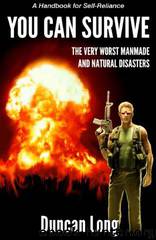YOU CAN SURVIVE the Very Worst Manmade and Natural Disasters: A Handbook for Self-Reliance by Duncan Long

Author:Duncan Long [Long, Duncan]
Language: eng
Format: epub, mobi
Publisher: Duncan Long Publications
Published: 2012-11-11T07:00:00+00:00
The Most Important Essentials
Remember that there are needs other than physical. These are just as important and must be taken into consideration.
Household pets will be as traumatized by an earthquake (if not more so) than their owners. Since having the pet alive and well can be a morale booster to a family, it’s wise to leash dogs and cats to keep them in the vicinity of where the family is staying. This will also keep them out from under foot when work is being carried out.
Children will be under unusual stress following a major disaster. Loss of household possessions will trigger a fear of being abandoned by parents. Therefore, it’s important to keep the family together as much as possible and to verbally reassure children that the parents will continue to care for them. Never leave a child alone in an emergency shelter while you go back to check the damage done to your home. It’s better to wait and go as a family later. (Keep your priorities straight: your children’s well being is more important than whether or not your possessions remain intact, right? If so, you should act like it!)
Fear is contagious. If you can make the best of your situation, it’s going to have a more positive effect on your family than if you’re going around wringing your hands and weeping. Yes, you should express fears and doubts; bottling things up may cause emotional problems. But a stiff upper lip in times of emergency will go a long way toward smoothing things out and making things easier in the long run. This is especially true if you have small children who may have trouble being reasoned with.
On the flip side of things, children should be encouraged to talk about and express their fears. Then you should reassure them and point out that you’ve all survived the worst and now all that you’ll have to do is rebuild. Let children know that things will be returning to normal soon. Be sure, too, to let children know that their fear is normal and that they have, indeed, gone through a “scary situation.”
When possible, children should be allowed to help with various repair and maintenance chores following a disaster. While they may be of little help in cooking or checking damage, it will keep them busy and near a parent. This will do much to minimize their emotional trauma following an emergency. (Engaging in the “emergency drills” outlined elsewhere in this manual will also help to minimize the fear children will experience during and after an emergency.)
Research from the aftermath of earthquakes, hurricanes, and other natural disasters indicates that those with minor emotional or mental problems are more apt to “go over the deep end” during an emergency. If you have family members or neighbors with a history of such problems, you should be especially supportive with them to try to ease them through such a crisis.
Be watchful for potential problems that may first exhibit themselves by failure to communicate.
Download
YOU CAN SURVIVE the Very Worst Manmade and Natural Disasters: A Handbook for Self-Reliance by Duncan Long.mobi
This site does not store any files on its server. We only index and link to content provided by other sites. Please contact the content providers to delete copyright contents if any and email us, we'll remove relevant links or contents immediately.
SAS Survival Handbook by John 'Lofty' Wiseman(2717)
The Splendid and the Vile by Erik Larson(2458)
Food and Water in an Emergency by Food & Water In An Emergency(2394)
Hidden Valley Road by Robert Kolker(2291)
Food Storage for Self-Sufficiency and Survival by Angela Paskett(2023)
The Smartest Kids in the World by Amanda Ripley(1854)
Extreme Food - What to Eat When Your Life Depends on It... by Bear Grylls(1807)
Hawke's Green Beret Survival Manual by Mykel Hawke(1691)
The Survival Savvy Family by Julie Sczerbinski(1690)
100 Skills You'll Need for the End of the World (as We Know It) by Ana Maria Spagna(1689)
How to Invent Everything by Ryan North(1648)
The Knowledge: How to Rebuild our World from Scratch by Lewis Dartnell(1607)
Prepper's Survival Medicine Handbook: A Lifesaving Collection of Emergency Procedures from U.S. Army Field Manuals by Scott Finazzo(1601)
Spy Secrets That Can Save Your Life: A Former CIA Officer Reveals Safety and Survival Techniques to Keep You and Your Family Protected by Jason Hanson(1589)
Lost and Stranded by Timothy Sprinkle(1546)
Mother Earth News Almanac by Mother Earth News(1541)
Prepper's Armed Defense by Jim Cobb(1537)
The Complete U.S. Army Survival Guide to Foraging Skills, Tactics, and Techniques by Jay McCullough(1527)
Brain Rules: 12 Principles for Surviving and Thriving at Work, Home, and School by John Medina(1504)
